牛津深圳版七年级下册 Module 3 Unit 6 Electricity 全单元知识点 课件 (共54张PPT)
文档属性
| 名称 | 牛津深圳版七年级下册 Module 3 Unit 6 Electricity 全单元知识点 课件 (共54张PPT) | 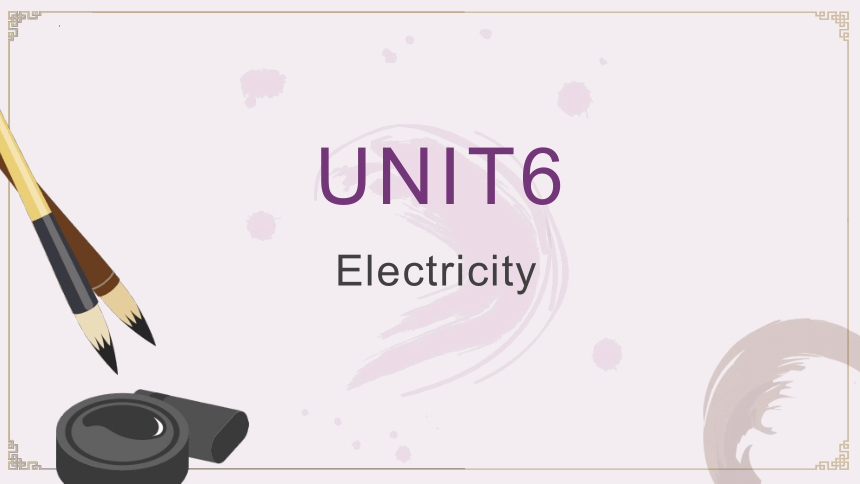 | |
| 格式 | zip | ||
| 文件大小 | 64.2MB | ||
| 资源类型 | 教案 | ||
| 版本资源 | 牛津深圳版 | ||
| 科目 | 英语 | ||
| 更新时间 | 2022-08-16 12:37:08 | ||
图片预览

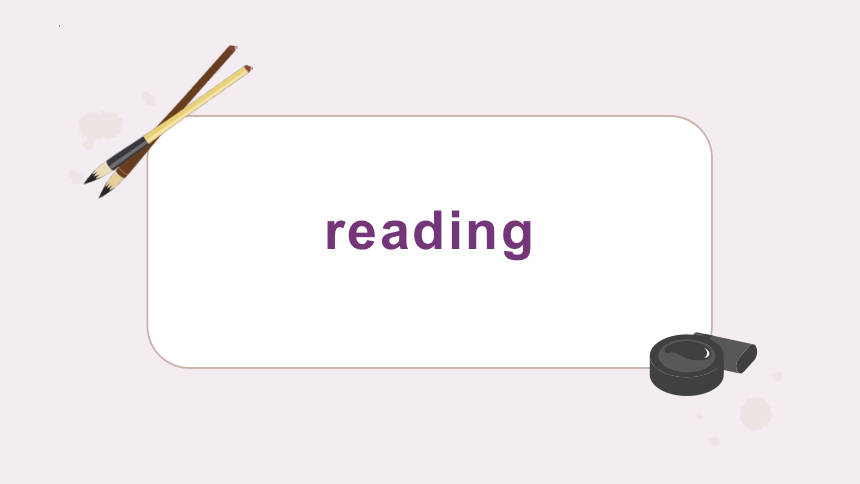
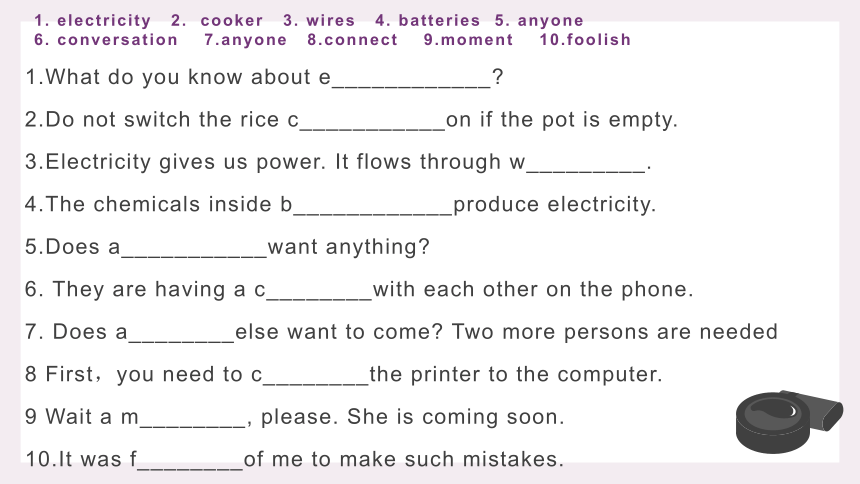
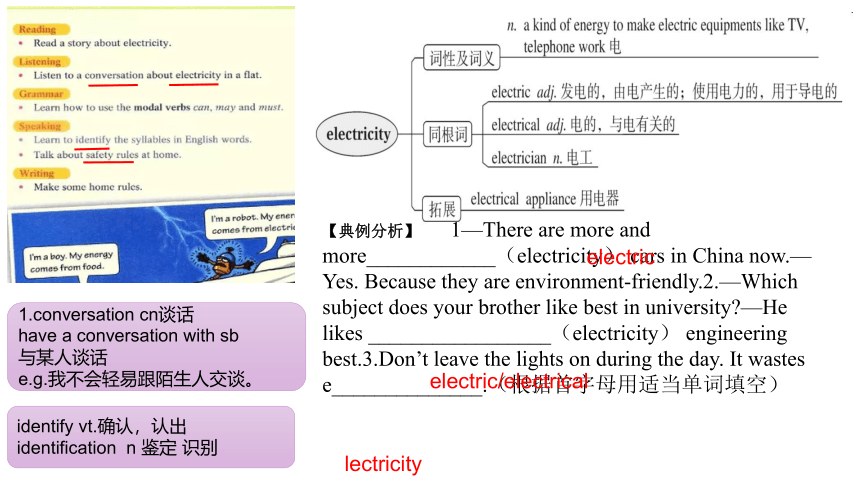
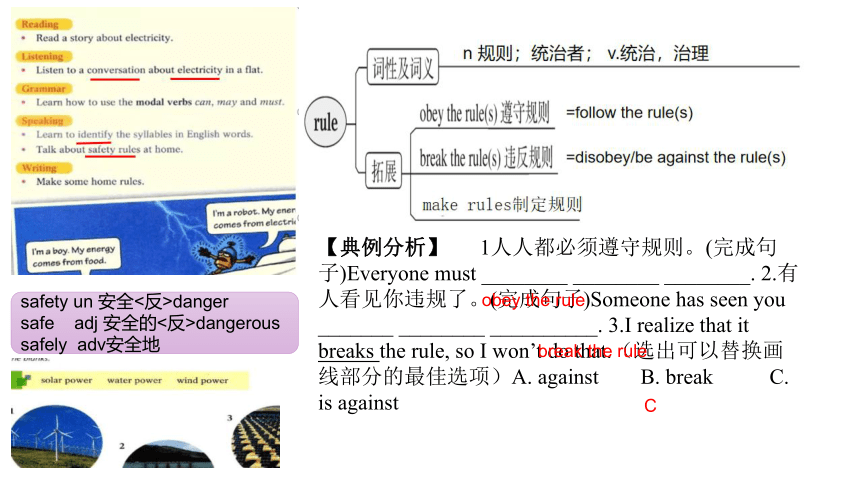
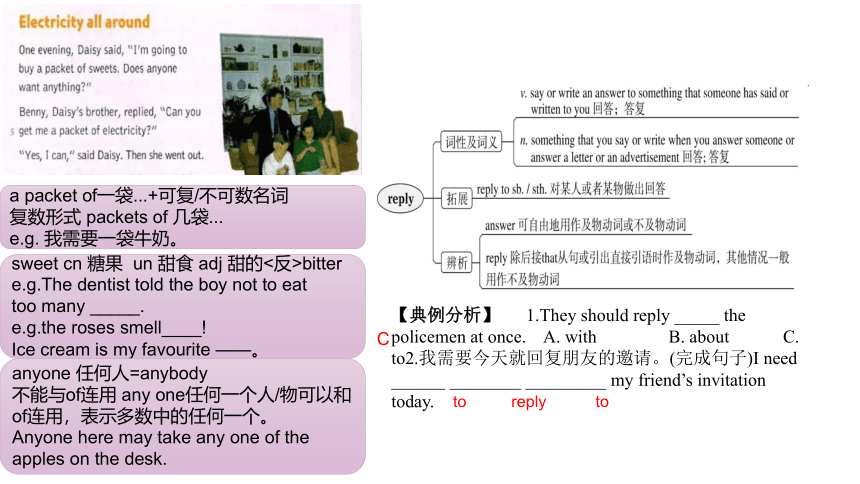
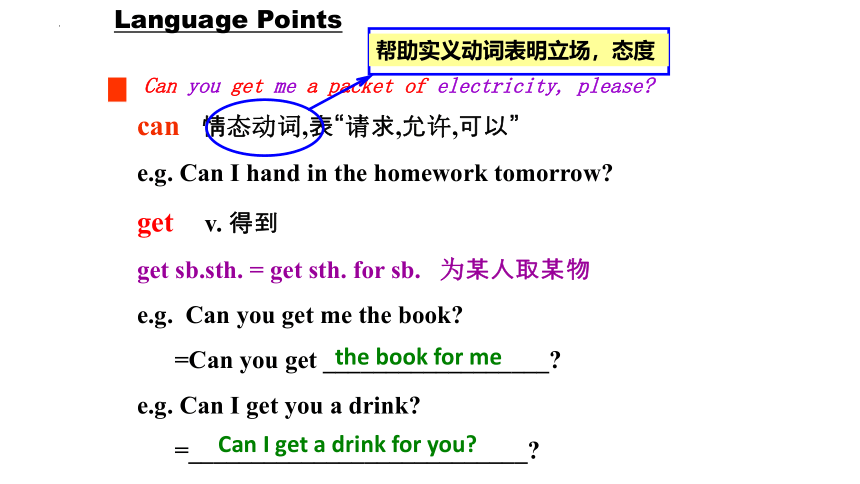
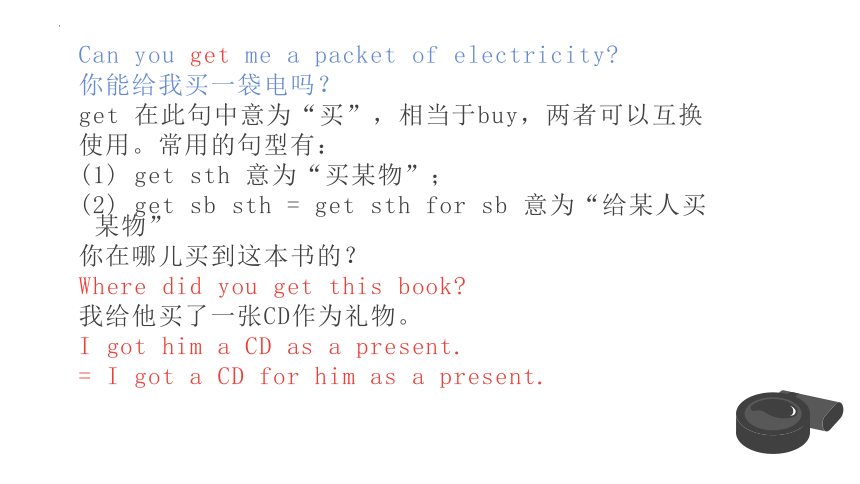
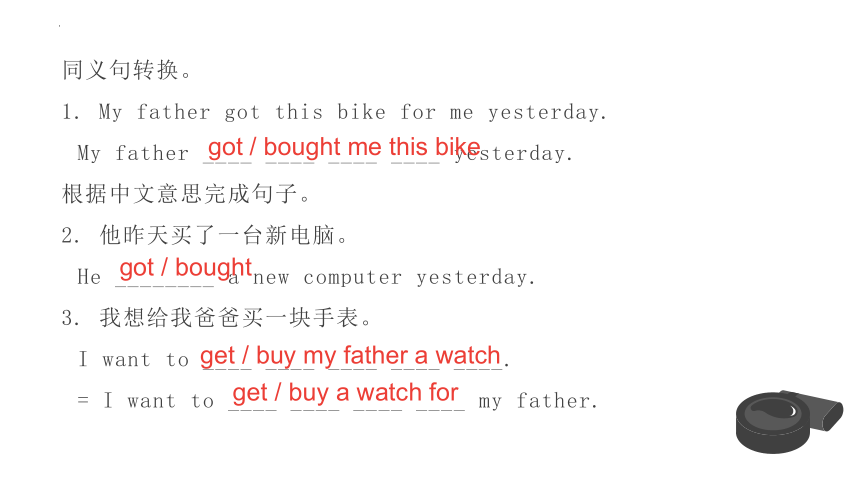
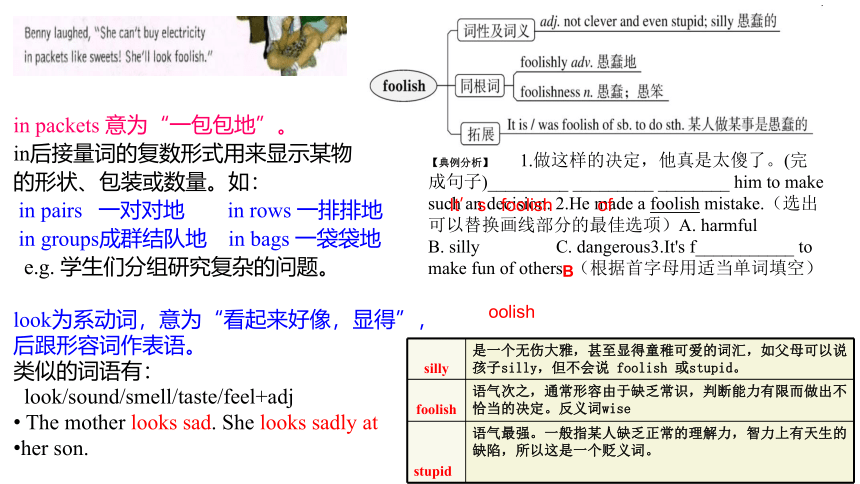
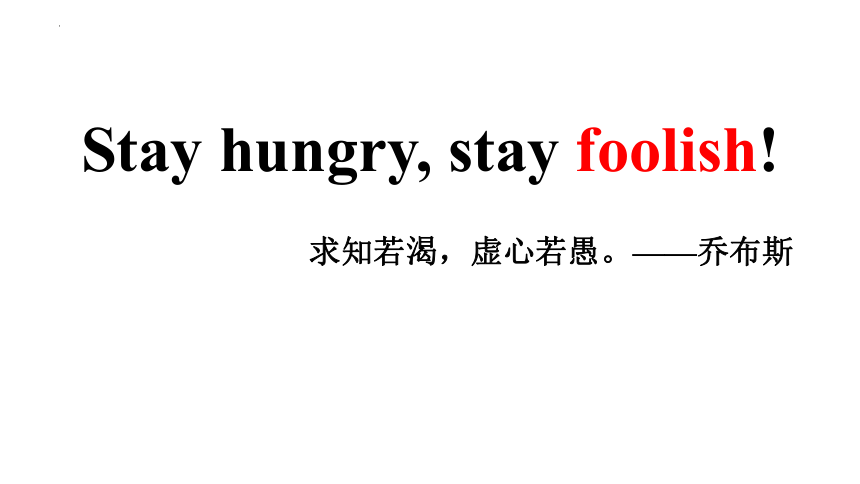
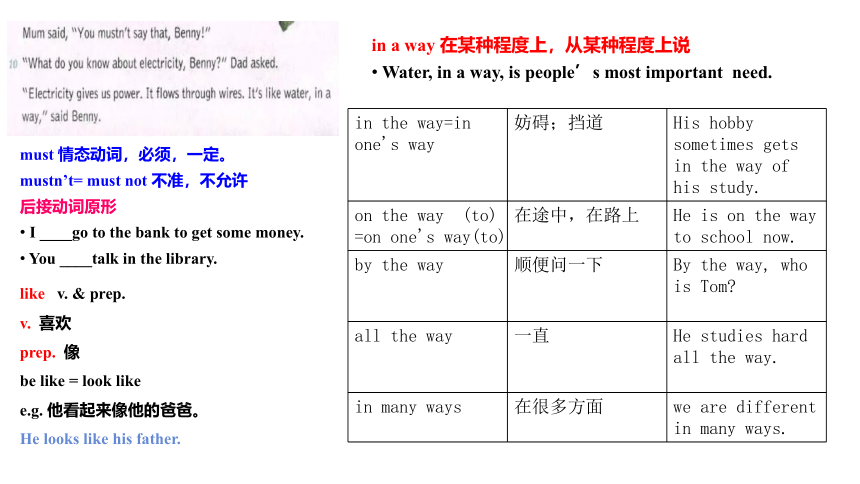
文档简介
(共54张PPT)
UNIT6
Electricity
reading
1.What do you know about e____________
2.Do not switch the rice c___________on if the pot is empty.
3.Electricity gives us power. It flows through w_________.
4.The chemicals inside b____________produce electricity.
5.Does a___________want anything
6. They are having a c________with each other on the phone.
7. Does a________else want to come Two more persons are needed
8 First,you need to c________the printer to the computer.
9 Wait a m________, please. She is coming soon.
10.It was f________of me to make such mistakes.
1. electricity 2. cooker 3. wires 4. batteries 5. anyone
6. conversation 7.anyone 8.connect 9.moment 10.foolish
1.conversation cn谈话
have a conversation with sb
与某人谈话
e.g.我不会轻易跟陌生人交谈。
【典例分析】 1—There are more and more____________(electricity) cars in China now.—Yes. Because they are environment-friendly.2.—Which subject does your brother like best in university —He likes _________________(electricity) engineering best.3.Don’t leave the lights on during the day. It wastes e______________.(根据首字母用适当单词填空)
identify vt.确认,认出
identification n 鉴定 识别
electric
electric/electrical
lectricity
safety un 安全<反>danger
safe adj 安全的<反>dangerous
safely adv安全地
【典例分析】 1人人都必须遵守规则。(完成句子)Everyone must ________ ________ ________. 2.有人看见你违规了。(完成句子)Someone has seen you _______ ________ __________. 3.I realize that it breaks the rule, so I won’t do that.(选出可以替换画线部分的最佳选项)A. against B. break C. is against
obey the rule
break the rule
C
a packet of一袋...+可复/不可数名词
复数形式 packets of 几袋...
e.g. 我需要一袋牛奶。
sweet cn 糖果 un 甜食 adj 甜的<反>bitter
e.g.The dentist told the boy not to eat
too many _____.
e.g.the roses smell____!
Ice cream is my favourite ——。
anyone 任何人=anybody
不能与of连用 any one任何一个人/物可以和of连用,表示多数中的任何一个。
Anyone here may take any one of the apples on the desk.
【典例分析】 1.They should reply _____ the policemen at once. A. with B. about C. to2.我需要今天就回复朋友的邀请。(完成句子)I need ______ ________ _________ my friend’s invitation today.
to reply to
C
Can you get me a packet of electricity, please
can 情态动词,表“请求,允许,可以”
e.g. Can I hand in the homework tomorrow
get v. 得到
get sb.sth. = get sth. for sb. 为某人取某物
e.g. Can you get me the book
=Can you get __________________
e.g. Can I get you a drink
=___________________________
帮助实义动词表明立场,态度
the book for me
Can I get a drink for you
Language Points
Can you get me a packet of electricity
你能给我买一袋电吗?
get 在此句中意为“买”,相当于buy,两者可以互换
使用。常用的句型有:
(1) get sth 意为“买某物”;
(2) get sb sth = get sth for sb 意为“给某人买某物”
你在哪儿买到这本书的?
Where did you get this book
我给他买了一张CD作为礼物。
I got him a CD as a present.
= I got a CD for him as a present.
同义句转换。
1. My father got this bike for me yesterday.
My father ____ ____ ____ ____ yesterday.
根据中文意思完成句子。
2. 他昨天买了一台新电脑。
He ________ a new computer yesterday.
3. 我想给我爸爸买一块手表。
I want to ____ ____ ____ ____ ____.
= I want to ____ ____ ____ ____ my father.
get / buy a watch for
got / bought me this bike
got / bought
get / buy my father a watch
in packets 意为“一包包地”。
in后接量词的复数形式用来显示某物
的形状、包装或数量。如:
in pairs 一对对地 in rows 一排排地
in groups成群结队地 in bags 一袋袋地
e.g. 学生们分组研究复杂的问题。
look为系动词,意为“看起来好像,显得”,
后跟形容词作表语。
类似的词语有:
look/sound/smell/taste/feel+adj
The mother looks sad. She looks sadly at
her son.
【典例分析】 1.做这样的决定,他真是太傻了。(完成句子)_________ _________ ________ him to make such an decision. 2.He made a foolish mistake.(选出可以替换画线部分的最佳选项)A. harmful B. silly C. dangerous3.It's f___________ to make fun of others. (根据首字母用适当单词填空)
It’s foolish of
B
oolish
silly 是一个无伤大雅,甚至显得童稚可爱的词汇,如父母可以说孩子silly,但不会说 foolish 或stupid。
foolish 语气次之,通常形容由于缺乏常识,判断能力有限而做出不恰当的决定。反义词wise
stupid 语气最强。一般指某人缺乏正常的理解力,智力上有天生的缺陷,所以这是一个贬义词。
Stay hungry, stay foolish!
求知若渴,虚心若愚。——乔布斯
must 情态动词,必须,一定。
mustn’t= must not 不准,不允许
后接动词原形
I ____go to the bank to get some money.
You ____talk in the library.
like v. & prep.
v. 喜欢
prep. 像
be like = look like
e.g. 他看起来像他的爸爸。
He looks like his father.
in a way 在某种程度上,从某种程度上说
Water, in a way, is people’s most important need.
in the way=in one's way 妨碍;挡道 His hobby sometimes gets in the way of his study.
on the way (to) =on one's way(to) 在途中,在路上 He is on the way to school now.
by the way 顺便问一下 By the way, who is Tom
all the way 一直 He studies hard all the way.
in many ways 在很多方面 we are different in many ways.
根据中文意思完成句子。
1. 在某种程度上,她是我们的朋友。
____ ____ ____ , she is our friend.
2. 顺便问问,明天汤姆来吗?
____ ____ ____, will Tom come tomorrow
3. 昨天在上学的路上,我碰见了李老师。
I met Miss Li ____ ____ ____ ____ school yesterday.
on the / my way to
In a way
By the way
connect v 连接 n connection连接,联系,关系
connect to… 把…连接到…上
be connected to 意为 “被连接到…上” 被动语态结构
Please connect the computer to internet.
把电脑连到因特网上。
connect…with… 把…和…联系起来
He is connected with the murder.
那件谋杀案和他有关。
1.这座桥将这个岛和大陆连接了起来。(完成句子) The bridge _______________ the island __________ the mainland. 2.We need a wireless _____________ (connect)
connects
to
connection
a moment later 意为“过了一会儿”。=after a moment
一段时间+later=after+一段时间
玛丽十年后回到家乡。
几个小时后他离开了屋子。
【典例分析】 1.就在此刻,一辆汽车停在了那座房子前。(完成句子)________ _________ ________, a car stopped at the house. 2. He thought _____ a moment and then spoke. A. at B. in C. for 3. He stood up _____ I called his name.A. at the moment B. for a moment C. the moment 4.I will call him back _____ a moment. A. at B. in C. for
At the moment
C
C
B
inside在...内部
<反>outside
produce electricity=make electricity产生电,发电
who looks foolish 特殊疑问词who后用单三
listening: rice cooker电饭煲
【典例分析】 1.I have to go and ______ the dinner. 2.Make these things and you are a ________. 3.I'm not a ________myself but I am interested in selling _________.
cook
cook
cook
cookers
rather than 而不是=instead of
选择最佳答案填空。
( )1. There ____ something in the box. You
must like it.
A. be B. is C. am D. are
( )2. Does ____ like this book
A. anything B. someone
C. something D. anybody
( )3. I’m hungry now. I want ____ to eat.
A. anything B. everything
C. something D. nothing
B
D
C
选择最佳答案填空。
( )1. Even though he was disabled (残疾的), he can
do many things ____ swimming, writing and
reading.
A. as B. for example C. that is D. like
( )2. He didn’t say ____.
A. anything B. something
C. nothing D. some thing
( )3. Nancy’s father ____ young and Tony ____ his
father.
A. looks, looks B. looks, looks like
C. looks like, looks D. looks like, looks like
( )4. He didn ’t say a word, but ____ a smile.
A. replied to B. replied with
C. replied D. replies to
B
D
A
B
1.lock the door锁门 lock v 锁上,cn门锁
2.switch off/on关闭电源/打开电源
3.test the water 测试水test v.测验测试 cn测验测试
---take a test参加测试
pass a test通过测试
fail a test未通过测试
4.tidy up整理好,收拾妥当人称代词放中间。
e.g.你的鞋子到处都是,把它们整理好!
5.change the bulb 换灯泡
1.ask sb to do sth要求某人做某事
ask sb not to do sth要求某人不要做某事
ask sb for sth向某人要某物
ask for help寻求帮助
2.make rules制定规则
follow the rules遵守规则
3.air conditioner空调
4.touch v.触摸 碰 cn触摸,碰 un.联系
keep...in touch with与...保持联系
touch and go 一触即发
1.safety rules安全规则
2.electricity safety tips 安全用电小贴士
3.make sb/sth +adj比较级
4.electrical appliances电器
5.keep sb/sth adj
e.g.我们应该保持教室干净整洁。
We should keep the classroom clean and tidy.
6.outside prep.在...的外面 adv在外面adj户外的,外面的
7.unplug vt.拔掉...的电源插头
e.g.当你不用电脑时,拔掉电脑的电源插头很重要
when you don't use the computer, it is important to unplug it.
8.at least至少<反>at most至多
9.make sure 务必,确保 ;指将某事弄清楚 sure=certain
be sure确信;指某人对...有把握
1.care about关心 care for照顾,照料
2.climate change气候变化
3.since then自从那时起
4.more and more越来越...
1. as ......as
as many +名词复数+ as
和.......一样多的......
not as many as=fewer than
as much +不可数名词+ as 和.......一样多的......
not as much as= less than
as +形容词或副词的原级+ as 和.......一样......
He cannot speak as many languages as Lo.
I didn't drink as much milk as you.
1. share sth with sb和某人分享某物
2.take the medicine吃药
3.on time 按时,准时
in time及时
alone adj. / adv. 单独的;
指客观上无人陪伴,不表示内心的感觉
She lives alone in an apartment.
I went there alone.
lonely adj. 孤独的;
内心世界的孤独感
I feel lonely among strangers.
情态动词
考点一 情态动词的基本用法
一、定义
情态动词表示说话者的情感、态度和语气。它们本身有一定的意义,但没有人称和数的变化,不能单独作谓语,须和动词一起构成句子的谓语。表示否定时在情态动词后加not (must,have to除外),表示疑问时将情态动词提至主语前即可。
英语情态动词共有9种,即can,may,will,shall,dare.must,need,ought to,used to.有的情态动词有时态的变化。变化如下:
现在式 can may will shall dare must need ought to ----
过去式 could might would should dared --- --- --- used to
can ( could ) 能,会
may (might) 可以,可能
will (would) 将,会,愿意
must 必须 have to不得不
need 需要 sb need to do sth ,sth need doing某事需要被做 .
(shall)should=ought to应该
had better 最好 had better (not) do sth
dare敢
used to过去常常
二、常见情态动词用法
原形 (过去式) 用法 含义 例句
can (could) 1.表示能力(= be able to) 能;会 Tom can swim.
=Tom is able to swim.
汤姆会游泳。
2.(疑问句中)表示请求could 语气更委婉 可以 Could you give us a hand
你可以帮我们一下吗?
3.(否定句、疑问句中)表示可能性,猜测,怀疑不确定 can可能 can’t不可能 The boy can’t be Jim. He’s much taller.
这个男孩不可能是吉姆。他要高很多。
原形 (过去式) 用法 含义 例句
may (might) 1.表示可能性(可与maybe互换) 可能 Tony may know the way. =Maybe Tony knows the way.
托尼可能知道路。
2.表示客气请求 可以 May I come in
我可以进来吗?
3.表示祝愿 祝…… May you be happy!
祝你快乐!
原形 (过去式) 用法 含义 例句
must 表示义务、命令或要求 必须 We must tell the truth to our parents.
我们必须告诉父母真相。
表示肯定的猜测(否定猜测用can’t ) 一定 Lisa must be at home.
莉萨一定在家里。
(推测现在的状况)
You must be kidding!
你一定是在开玩笑!(推测现在正在发生的状况)
They must have seen the movie.
他们一定看过这部电影。
(must have done推测过去的状况)
原形 (过去式) 用法 含义 例句
shall (should) Shall. . . 用于第一人称,表示建议或请求 ……好 吗? Shall we ask the teacher for help
我们向老师寻求帮助好吗?
should用于各种人称,强调义务或责任 应该 Students shouldn’t have long hair.
学生们不应该留长发。
原形 (过去式) 用法 含义 例句
will (would) 用于第二人称疑问句中,表示征求意见或提建议 愿意 Will/Would you please take out the trash
你可以把垃圾拿出去吗?
will用于各种人称,表示意愿 Your parents will try their best to help you.
你的父母会尽最大努力帮助你。
【温馨提示】
(1)情态动词的过去式表示比原形更委婉的语气。
(2)mustn’t表示否定意义“禁止,不允许”。可与祈使句互换。例如:
You mustn’t play football in the street.
你不准在街道上踢足球。
(=Don’t play football in the street. )
(3)have to有人称、数和时态的变化,表示受客观条件限制,意为“不得不”。例如:
She has to take the bus to work.
她不得不坐公交车去上班。
(4)May. . . 句式的否定回答:No, . . . mustn’t/can’t.
Must. . . 句式的否定回答:No, . . . needn’t. /don't have to
①—May I smoke here ——我可以在这儿吸烟吗?
—No, you mustn’t. ——不,你不准。
②—Must I go now ——我必须现在走吗?
—No, you needn’t. ——不,你没必要。
(5)must,should,may,might都可以表示“可以”,可能性程度由大到小依次为:must﹥should﹥may﹥might。
考点二 易混情态动词
1. must & can’t
两者都表示推测,can’t意为“不可能”,must意为“一定”;句中一般会有说明推测理由的附属从句。例如:
―The girl in red must be Jenny. She often wears a red skirt to school. ——那个穿红衣服的女孩一定是珍妮。她经常穿着红色的裙子上学。
―No, it can’t be Jenny. I met her in the library just now and she was still reading newspapers there.
——不,一定不是珍妮。刚才我在图书馆看见她了,她还在那儿看报纸呢。
2. have to & must
(1)have to主要表示客观需要,意为“不得不”。有人称和时态的变化(has to; had to; will have to);
(2)must强调说话人的主观看法,意为“必须;应该”;
(3)否定形式的不同:mustn’t表示“禁止;不应该”;not have to表示“不必”,相当于needn’t。
例如:①The boy had to stay at home alone because his parents both went to work. 那个男孩不得不独自待在家里,因为他的父母都去上班了。
②We must go to school on time. 我们必须按时上学。
③You don’t have to (needn’t) lend me your car because young people mustn’t drive.
你不应该借给我你的车,因为年轻人不能开车。
3. can & be able to
(1)表示某种能力时,二者可通用;
(2)can只用于现在时和过去时(could), be able to可用于各种时态;
(3)遇有助动词或情态动词时只能用be able to。
例如:①Jack could (was able to) swim at the age of five.
杰克在五岁时就能游泳了。
②We’ll be able to fly to the moon soon.
不久我们就能飞往月球了。
4. maybe & may be
maybe用于句首表示“可能;也许”,相当于perhaps;may be中的may是情态动词,后接动词原形be,表示“可能是”,在句中作谓语。两者可互换。例如:
Maybe the boy is from Canada.
=The boy may be from Canada.
那个男孩可能来自加拿大。
1. (2012·铜仁中考)You _______ stop when the traffic light turns red.
A. can B. had better C. need D. must
【解析】选D。must是“必须,不得不”,根据下文出现的when the traffic light turns red可知是“你必须……”。
2. (2012·恩施中考)—Is that girl under the tree Mary
—No, that _______ be Mary. She is in New York.
A. can B. mustn’t C. can’t
【解析】选C。由答语“她在纽约。”可知,那个女孩不可能是玛丽,故用can’t。
3. (2011·重庆中考)—Mr. Wang, can I finish my homework tomorrow
—Sorry, you _______.
A. can’t B. don’t C. needn’t D. won’t
【解析】选A。can’t“不能”,don’t“不”,needn’t“不需要”,won’t为will not的缩写“将不会”。根据问句“王老师,我能明天完成作业吗?”可知回答应为“对不起,你不能。”故选A。
4. (2011·温州中考)—Dad, can I go to the movies tonight
—Sure, but you _______ come back home before 9 o’clock.
A. can B. must C. may D. might
【解析】选B。句意:——爸爸,今晚我可以去看电影吗?——当然,但是你必须在9点之前回家。can 表示“能;会”;must 表示“必须”;may和might表示“可以”,故选B。
5. (2011·福州中考)— Mom, must I finish my homework now
— No, you _______. You may have supper first.
A. mustn’t B. needn’t C. can’t
【解析】选B。句意:——妈妈,我现在必须完成家庭作业吗?——不,你不需要。你可以先吃饭。对must引导的一般疑问句,否定回答时常用No, . . . needn’t, 故选B。
6. (2011·菏泽中考)—Will you stay for some more days
—Sorry, I ______. My mother called to ask me to go back at once.
A. mustn’t B. may not
C. can’t D. wouldn’t
【解析】选C。句意:——你再待几天好吗?——对不起,我不能。我的母亲打电话让我马上回去。mustn’t“禁止”;may not“可能不”;wouldn’t“不愿做……,将要不……”。故选C。
7. (2012·荆州中考)—Shall we take a taxi
—No, we _______. It’s not far from here.
A. can’t B. mustn’t
C. shouldn’t D. needn’t
【解析】选D。由答语“它离这儿不远。”可知没必要乘出租车。故选D。
8. (2011·滨州中考)—Must I get up early tomorrow morning
—No, _______.
A. you mustn’t B. I don’t think you have to
C. you can’t D. you need
【解析】选B。情态动词must引导的一般疑问句的否定答语为“No, sb. needn’t. / No, sb. don’t/doesn’t have to. ”故选B。
9. (2011·乐山中考)It rained heavily, so we _______ stay at home watching TV or surfing the Internet all day.
A. could B. had to C. must
【解析】选B。外面下雨是待在家里的客观原因,故答案为B项。
10. (2012·包头中考)—You _______ be excited that you’re going back to your hometown soon.
—Yes, I can’t wait any longer.
A. shall B. can C. need D. must
【解析】选D。由答语“是的,我不能再等待了。”可知,上一句应该是“你一定很兴奋,你不久将回到你的家乡。”must“一定”,表示有把握的肯定推测。
UNIT6
Electricity
reading
1.What do you know about e____________
2.Do not switch the rice c___________on if the pot is empty.
3.Electricity gives us power. It flows through w_________.
4.The chemicals inside b____________produce electricity.
5.Does a___________want anything
6. They are having a c________with each other on the phone.
7. Does a________else want to come Two more persons are needed
8 First,you need to c________the printer to the computer.
9 Wait a m________, please. She is coming soon.
10.It was f________of me to make such mistakes.
1. electricity 2. cooker 3. wires 4. batteries 5. anyone
6. conversation 7.anyone 8.connect 9.moment 10.foolish
1.conversation cn谈话
have a conversation with sb
与某人谈话
e.g.我不会轻易跟陌生人交谈。
【典例分析】 1—There are more and more____________(electricity) cars in China now.—Yes. Because they are environment-friendly.2.—Which subject does your brother like best in university —He likes _________________(electricity) engineering best.3.Don’t leave the lights on during the day. It wastes e______________.(根据首字母用适当单词填空)
identify vt.确认,认出
identification n 鉴定 识别
electric
electric/electrical
lectricity
safety un 安全<反>danger
safe adj 安全的<反>dangerous
safely adv安全地
【典例分析】 1人人都必须遵守规则。(完成句子)Everyone must ________ ________ ________. 2.有人看见你违规了。(完成句子)Someone has seen you _______ ________ __________. 3.I realize that it breaks the rule, so I won’t do that.(选出可以替换画线部分的最佳选项)A. against B. break C. is against
obey the rule
break the rule
C
a packet of一袋...+可复/不可数名词
复数形式 packets of 几袋...
e.g. 我需要一袋牛奶。
sweet cn 糖果 un 甜食 adj 甜的<反>bitter
e.g.The dentist told the boy not to eat
too many _____.
e.g.the roses smell____!
Ice cream is my favourite ——。
anyone 任何人=anybody
不能与of连用 any one任何一个人/物可以和of连用,表示多数中的任何一个。
Anyone here may take any one of the apples on the desk.
【典例分析】 1.They should reply _____ the policemen at once. A. with B. about C. to2.我需要今天就回复朋友的邀请。(完成句子)I need ______ ________ _________ my friend’s invitation today.
to reply to
C
Can you get me a packet of electricity, please
can 情态动词,表“请求,允许,可以”
e.g. Can I hand in the homework tomorrow
get v. 得到
get sb.sth. = get sth. for sb. 为某人取某物
e.g. Can you get me the book
=Can you get __________________
e.g. Can I get you a drink
=___________________________
帮助实义动词表明立场,态度
the book for me
Can I get a drink for you
Language Points
Can you get me a packet of electricity
你能给我买一袋电吗?
get 在此句中意为“买”,相当于buy,两者可以互换
使用。常用的句型有:
(1) get sth 意为“买某物”;
(2) get sb sth = get sth for sb 意为“给某人买某物”
你在哪儿买到这本书的?
Where did you get this book
我给他买了一张CD作为礼物。
I got him a CD as a present.
= I got a CD for him as a present.
同义句转换。
1. My father got this bike for me yesterday.
My father ____ ____ ____ ____ yesterday.
根据中文意思完成句子。
2. 他昨天买了一台新电脑。
He ________ a new computer yesterday.
3. 我想给我爸爸买一块手表。
I want to ____ ____ ____ ____ ____.
= I want to ____ ____ ____ ____ my father.
get / buy a watch for
got / bought me this bike
got / bought
get / buy my father a watch
in packets 意为“一包包地”。
in后接量词的复数形式用来显示某物
的形状、包装或数量。如:
in pairs 一对对地 in rows 一排排地
in groups成群结队地 in bags 一袋袋地
e.g. 学生们分组研究复杂的问题。
look为系动词,意为“看起来好像,显得”,
后跟形容词作表语。
类似的词语有:
look/sound/smell/taste/feel+adj
The mother looks sad. She looks sadly at
her son.
【典例分析】 1.做这样的决定,他真是太傻了。(完成句子)_________ _________ ________ him to make such an decision. 2.He made a foolish mistake.(选出可以替换画线部分的最佳选项)A. harmful B. silly C. dangerous3.It's f___________ to make fun of others. (根据首字母用适当单词填空)
It’s foolish of
B
oolish
silly 是一个无伤大雅,甚至显得童稚可爱的词汇,如父母可以说孩子silly,但不会说 foolish 或stupid。
foolish 语气次之,通常形容由于缺乏常识,判断能力有限而做出不恰当的决定。反义词wise
stupid 语气最强。一般指某人缺乏正常的理解力,智力上有天生的缺陷,所以这是一个贬义词。
Stay hungry, stay foolish!
求知若渴,虚心若愚。——乔布斯
must 情态动词,必须,一定。
mustn’t= must not 不准,不允许
后接动词原形
I ____go to the bank to get some money.
You ____talk in the library.
like v. & prep.
v. 喜欢
prep. 像
be like = look like
e.g. 他看起来像他的爸爸。
He looks like his father.
in a way 在某种程度上,从某种程度上说
Water, in a way, is people’s most important need.
in the way=in one's way 妨碍;挡道 His hobby sometimes gets in the way of his study.
on the way (to) =on one's way(to) 在途中,在路上 He is on the way to school now.
by the way 顺便问一下 By the way, who is Tom
all the way 一直 He studies hard all the way.
in many ways 在很多方面 we are different in many ways.
根据中文意思完成句子。
1. 在某种程度上,她是我们的朋友。
____ ____ ____ , she is our friend.
2. 顺便问问,明天汤姆来吗?
____ ____ ____, will Tom come tomorrow
3. 昨天在上学的路上,我碰见了李老师。
I met Miss Li ____ ____ ____ ____ school yesterday.
on the / my way to
In a way
By the way
connect v 连接 n connection连接,联系,关系
connect to… 把…连接到…上
be connected to 意为 “被连接到…上” 被动语态结构
Please connect the computer to internet.
把电脑连到因特网上。
connect…with… 把…和…联系起来
He is connected with the murder.
那件谋杀案和他有关。
1.这座桥将这个岛和大陆连接了起来。(完成句子) The bridge _______________ the island __________ the mainland. 2.We need a wireless _____________ (connect)
connects
to
connection
a moment later 意为“过了一会儿”。=after a moment
一段时间+later=after+一段时间
玛丽十年后回到家乡。
几个小时后他离开了屋子。
【典例分析】 1.就在此刻,一辆汽车停在了那座房子前。(完成句子)________ _________ ________, a car stopped at the house. 2. He thought _____ a moment and then spoke. A. at B. in C. for 3. He stood up _____ I called his name.A. at the moment B. for a moment C. the moment 4.I will call him back _____ a moment. A. at B. in C. for
At the moment
C
C
B
inside在...内部
<反>outside
produce electricity=make electricity产生电,发电
who looks foolish 特殊疑问词who后用单三
listening: rice cooker电饭煲
【典例分析】 1.I have to go and ______ the dinner. 2.Make these things and you are a ________. 3.I'm not a ________myself but I am interested in selling _________.
cook
cook
cook
cookers
rather than 而不是=instead of
选择最佳答案填空。
( )1. There ____ something in the box. You
must like it.
A. be B. is C. am D. are
( )2. Does ____ like this book
A. anything B. someone
C. something D. anybody
( )3. I’m hungry now. I want ____ to eat.
A. anything B. everything
C. something D. nothing
B
D
C
选择最佳答案填空。
( )1. Even though he was disabled (残疾的), he can
do many things ____ swimming, writing and
reading.
A. as B. for example C. that is D. like
( )2. He didn’t say ____.
A. anything B. something
C. nothing D. some thing
( )3. Nancy’s father ____ young and Tony ____ his
father.
A. looks, looks B. looks, looks like
C. looks like, looks D. looks like, looks like
( )4. He didn ’t say a word, but ____ a smile.
A. replied to B. replied with
C. replied D. replies to
B
D
A
B
1.lock the door锁门 lock v 锁上,cn门锁
2.switch off/on关闭电源/打开电源
3.test the water 测试水test v.测验测试 cn测验测试
---take a test参加测试
pass a test通过测试
fail a test未通过测试
4.tidy up整理好,收拾妥当人称代词放中间。
e.g.你的鞋子到处都是,把它们整理好!
5.change the bulb 换灯泡
1.ask sb to do sth要求某人做某事
ask sb not to do sth要求某人不要做某事
ask sb for sth向某人要某物
ask for help寻求帮助
2.make rules制定规则
follow the rules遵守规则
3.air conditioner空调
4.touch v.触摸 碰 cn触摸,碰 un.联系
keep...in touch with与...保持联系
touch and go 一触即发
1.safety rules安全规则
2.electricity safety tips 安全用电小贴士
3.make sb/sth +adj比较级
4.electrical appliances电器
5.keep sb/sth adj
e.g.我们应该保持教室干净整洁。
We should keep the classroom clean and tidy.
6.outside prep.在...的外面 adv在外面adj户外的,外面的
7.unplug vt.拔掉...的电源插头
e.g.当你不用电脑时,拔掉电脑的电源插头很重要
when you don't use the computer, it is important to unplug it.
8.at least至少<反>at most至多
9.make sure 务必,确保 ;指将某事弄清楚 sure=certain
be sure确信;指某人对...有把握
1.care about关心 care for照顾,照料
2.climate change气候变化
3.since then自从那时起
4.more and more越来越...
1. as ......as
as many +名词复数+ as
和.......一样多的......
not as many as=fewer than
as much +不可数名词+ as 和.......一样多的......
not as much as= less than
as +形容词或副词的原级+ as 和.......一样......
He cannot speak as many languages as Lo.
I didn't drink as much milk as you.
1. share sth with sb和某人分享某物
2.take the medicine吃药
3.on time 按时,准时
in time及时
alone adj. / adv. 单独的;
指客观上无人陪伴,不表示内心的感觉
She lives alone in an apartment.
I went there alone.
lonely adj. 孤独的;
内心世界的孤独感
I feel lonely among strangers.
情态动词
考点一 情态动词的基本用法
一、定义
情态动词表示说话者的情感、态度和语气。它们本身有一定的意义,但没有人称和数的变化,不能单独作谓语,须和动词一起构成句子的谓语。表示否定时在情态动词后加not (must,have to除外),表示疑问时将情态动词提至主语前即可。
英语情态动词共有9种,即can,may,will,shall,dare.must,need,ought to,used to.有的情态动词有时态的变化。变化如下:
现在式 can may will shall dare must need ought to ----
过去式 could might would should dared --- --- --- used to
can ( could ) 能,会
may (might) 可以,可能
will (would) 将,会,愿意
must 必须 have to不得不
need 需要 sb need to do sth ,sth need doing某事需要被做 .
(shall)should=ought to应该
had better 最好 had better (not) do sth
dare敢
used to过去常常
二、常见情态动词用法
原形 (过去式) 用法 含义 例句
can (could) 1.表示能力(= be able to) 能;会 Tom can swim.
=Tom is able to swim.
汤姆会游泳。
2.(疑问句中)表示请求could 语气更委婉 可以 Could you give us a hand
你可以帮我们一下吗?
3.(否定句、疑问句中)表示可能性,猜测,怀疑不确定 can可能 can’t不可能 The boy can’t be Jim. He’s much taller.
这个男孩不可能是吉姆。他要高很多。
原形 (过去式) 用法 含义 例句
may (might) 1.表示可能性(可与maybe互换) 可能 Tony may know the way. =Maybe Tony knows the way.
托尼可能知道路。
2.表示客气请求 可以 May I come in
我可以进来吗?
3.表示祝愿 祝…… May you be happy!
祝你快乐!
原形 (过去式) 用法 含义 例句
must 表示义务、命令或要求 必须 We must tell the truth to our parents.
我们必须告诉父母真相。
表示肯定的猜测(否定猜测用can’t ) 一定 Lisa must be at home.
莉萨一定在家里。
(推测现在的状况)
You must be kidding!
你一定是在开玩笑!(推测现在正在发生的状况)
They must have seen the movie.
他们一定看过这部电影。
(must have done推测过去的状况)
原形 (过去式) 用法 含义 例句
shall (should) Shall. . . 用于第一人称,表示建议或请求 ……好 吗? Shall we ask the teacher for help
我们向老师寻求帮助好吗?
should用于各种人称,强调义务或责任 应该 Students shouldn’t have long hair.
学生们不应该留长发。
原形 (过去式) 用法 含义 例句
will (would) 用于第二人称疑问句中,表示征求意见或提建议 愿意 Will/Would you please take out the trash
你可以把垃圾拿出去吗?
will用于各种人称,表示意愿 Your parents will try their best to help you.
你的父母会尽最大努力帮助你。
【温馨提示】
(1)情态动词的过去式表示比原形更委婉的语气。
(2)mustn’t表示否定意义“禁止,不允许”。可与祈使句互换。例如:
You mustn’t play football in the street.
你不准在街道上踢足球。
(=Don’t play football in the street. )
(3)have to有人称、数和时态的变化,表示受客观条件限制,意为“不得不”。例如:
She has to take the bus to work.
她不得不坐公交车去上班。
(4)May. . . 句式的否定回答:No, . . . mustn’t/can’t.
Must. . . 句式的否定回答:No, . . . needn’t. /don't have to
①—May I smoke here ——我可以在这儿吸烟吗?
—No, you mustn’t. ——不,你不准。
②—Must I go now ——我必须现在走吗?
—No, you needn’t. ——不,你没必要。
(5)must,should,may,might都可以表示“可以”,可能性程度由大到小依次为:must﹥should﹥may﹥might。
考点二 易混情态动词
1. must & can’t
两者都表示推测,can’t意为“不可能”,must意为“一定”;句中一般会有说明推测理由的附属从句。例如:
―The girl in red must be Jenny. She often wears a red skirt to school. ——那个穿红衣服的女孩一定是珍妮。她经常穿着红色的裙子上学。
―No, it can’t be Jenny. I met her in the library just now and she was still reading newspapers there.
——不,一定不是珍妮。刚才我在图书馆看见她了,她还在那儿看报纸呢。
2. have to & must
(1)have to主要表示客观需要,意为“不得不”。有人称和时态的变化(has to; had to; will have to);
(2)must强调说话人的主观看法,意为“必须;应该”;
(3)否定形式的不同:mustn’t表示“禁止;不应该”;not have to表示“不必”,相当于needn’t。
例如:①The boy had to stay at home alone because his parents both went to work. 那个男孩不得不独自待在家里,因为他的父母都去上班了。
②We must go to school on time. 我们必须按时上学。
③You don’t have to (needn’t) lend me your car because young people mustn’t drive.
你不应该借给我你的车,因为年轻人不能开车。
3. can & be able to
(1)表示某种能力时,二者可通用;
(2)can只用于现在时和过去时(could), be able to可用于各种时态;
(3)遇有助动词或情态动词时只能用be able to。
例如:①Jack could (was able to) swim at the age of five.
杰克在五岁时就能游泳了。
②We’ll be able to fly to the moon soon.
不久我们就能飞往月球了。
4. maybe & may be
maybe用于句首表示“可能;也许”,相当于perhaps;may be中的may是情态动词,后接动词原形be,表示“可能是”,在句中作谓语。两者可互换。例如:
Maybe the boy is from Canada.
=The boy may be from Canada.
那个男孩可能来自加拿大。
1. (2012·铜仁中考)You _______ stop when the traffic light turns red.
A. can B. had better C. need D. must
【解析】选D。must是“必须,不得不”,根据下文出现的when the traffic light turns red可知是“你必须……”。
2. (2012·恩施中考)—Is that girl under the tree Mary
—No, that _______ be Mary. She is in New York.
A. can B. mustn’t C. can’t
【解析】选C。由答语“她在纽约。”可知,那个女孩不可能是玛丽,故用can’t。
3. (2011·重庆中考)—Mr. Wang, can I finish my homework tomorrow
—Sorry, you _______.
A. can’t B. don’t C. needn’t D. won’t
【解析】选A。can’t“不能”,don’t“不”,needn’t“不需要”,won’t为will not的缩写“将不会”。根据问句“王老师,我能明天完成作业吗?”可知回答应为“对不起,你不能。”故选A。
4. (2011·温州中考)—Dad, can I go to the movies tonight
—Sure, but you _______ come back home before 9 o’clock.
A. can B. must C. may D. might
【解析】选B。句意:——爸爸,今晚我可以去看电影吗?——当然,但是你必须在9点之前回家。can 表示“能;会”;must 表示“必须”;may和might表示“可以”,故选B。
5. (2011·福州中考)— Mom, must I finish my homework now
— No, you _______. You may have supper first.
A. mustn’t B. needn’t C. can’t
【解析】选B。句意:——妈妈,我现在必须完成家庭作业吗?——不,你不需要。你可以先吃饭。对must引导的一般疑问句,否定回答时常用No, . . . needn’t, 故选B。
6. (2011·菏泽中考)—Will you stay for some more days
—Sorry, I ______. My mother called to ask me to go back at once.
A. mustn’t B. may not
C. can’t D. wouldn’t
【解析】选C。句意:——你再待几天好吗?——对不起,我不能。我的母亲打电话让我马上回去。mustn’t“禁止”;may not“可能不”;wouldn’t“不愿做……,将要不……”。故选C。
7. (2012·荆州中考)—Shall we take a taxi
—No, we _______. It’s not far from here.
A. can’t B. mustn’t
C. shouldn’t D. needn’t
【解析】选D。由答语“它离这儿不远。”可知没必要乘出租车。故选D。
8. (2011·滨州中考)—Must I get up early tomorrow morning
—No, _______.
A. you mustn’t B. I don’t think you have to
C. you can’t D. you need
【解析】选B。情态动词must引导的一般疑问句的否定答语为“No, sb. needn’t. / No, sb. don’t/doesn’t have to. ”故选B。
9. (2011·乐山中考)It rained heavily, so we _______ stay at home watching TV or surfing the Internet all day.
A. could B. had to C. must
【解析】选B。外面下雨是待在家里的客观原因,故答案为B项。
10. (2012·包头中考)—You _______ be excited that you’re going back to your hometown soon.
—Yes, I can’t wait any longer.
A. shall B. can C. need D. must
【解析】选D。由答语“是的,我不能再等待了。”可知,上一句应该是“你一定很兴奋,你不久将回到你的家乡。”must“一定”,表示有把握的肯定推测。
